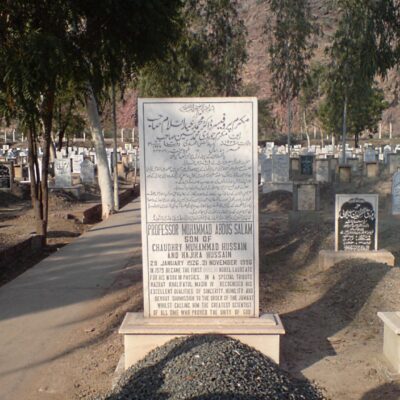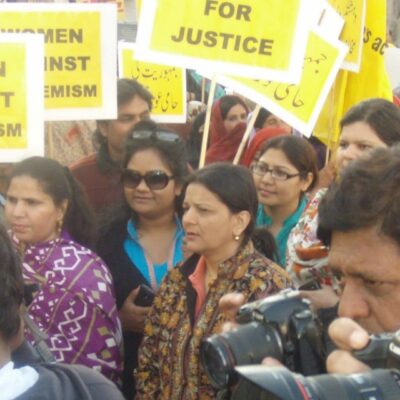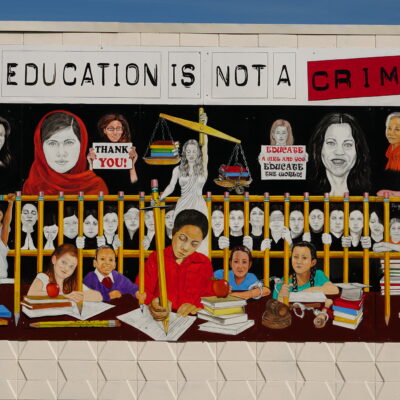The question of how Islamic law addresses the rights of religious minorities has taken on new urgency today in light of growing global demands for equal citizenship and religious freedom.
Historically, Muslim states managed religious diversity through the dhimma system, which offered protected status to non-Muslims but fell short of full legal equality. This system was shaped by the historical context in which it developed, but it is now increasingly questioned in light of modern human rights principles.
In response, a number of contemporary Muslim scholars are drawing on the Islamic tradition and human rights norms to propose more inclusive approaches to governance.
There is currently an extensive body of literature on this debate. For example, Anver Emon notes, that classical Islamic laws on minorities were rooted in a specific context of governance that differs sharply from today’s expectations of legal equality. Other scholars such as Niaz Shah and Donna Arzt revisit the Qur’anic foundations of religious tolerance. Milka Levy-Rubin, Wadi Zatoan Haddad and Mun’im Sirry, have re-examined early Islamic practices—such as the Constitution of Medina—as historical precedents for managing religiously diverse societies. Meanwhile, Abdullahi A. An-Na`im argues for a reinterpretation of Islamic law that aligns with international human rights standards to grant equal citizenship.
Classical Islamic law and religious minorities
Classical Islamic law conceptualised the status of non-Muslims living under Muslim rule through the dhimma system, based on the Qur’anic recognition of the People of the Book (ahl al-kitab) (Q. 9:29).
The contract between non-Muslim communities and the Muslim state, for example, the Umayyad, Abbasid or Ottoman, historically, was based on several key ideas, including that the life and property of protected communities (ahl al-dhimma) should be safeguarded, that non-Muslim religious communities should have the freedom to practice their religion without coercion from the Muslim state and that communities should be allowed to manifest their religion publicly to the extent permitted by law. Each religious community was also given autonomy to handle certain personal legal matters, such as marriage, dietary laws, inheritance and divorce. While the concept of equal citizenship had not yet emerged, the dhimma system appears to have functioned reasonably well for its time. Although non-Muslims did not enjoy equal rights, the various religious communities generally had a clear understanding of their rights and obligations—arguably more so than in some other societies of the period.
The dhimma arrangement was a continuation of practices found in other empires, including the Byzantine and Sassanid empires, at the time of the emergence of Islam. Under this Islamic arrangement, minority religious communities faced certain restrictions. Some were related to Islamic religious law, such as restrictions on marriage and inheritance between Muslims and non-Muslims. Others, at least in theory, prevented non-Muslims from holding high public office and from certain public expressions of their religion, proselytising among Muslims, displaying religious symbols, such as crosses and the ringing of church bells, in predominantly Muslim neighbourhoods.
Summarising these types of conditions, al-Mawardi (d. 1058), a leading authority on Islamic governance in the pre-modern period, divided the conditions in a dhimmi contract into two types. The first type is non-negotiable and includes rules dhimmis must abide by whether they were written in a contract or not, such as paying the jizya tax, accepting Muslim political authority and not disrespecting Islam. The second type depended on the ruler’s judgement and the public interest. These could include extra conditions based on the situation at the time, such as limits on new churches or holding public office. Many restrictive rules and practices related to dhimmis in successive Muslim states appear to belong to the second category.
While Muslim jurists discussed specific standard terms for agreements between the Muslim state and dhimmi communities, such as the restrictions outlined above, these rules were not applied uniformly. In some cases—depending on the local context, the temperament of authorities and the relative harmony or lack thereof between religious communities—dhimmis were treated very similarly to Muslim citizens,especially if the non-Muslims contributed particular skills to the community or state. For example, scientists, philosophers, artisans and literary figures were highly regarded under various rulers in the Umayyad, Abbasid and Ottoman empires. The Umayyad caliphs had Christians in senior positions within the bureaucracy. During the Abbasid period, Caliphs Harun al-Rashid and al-Ma’mun appointed Christian scholars to lead major educational institutions. The translation movement—an ambitious project funded by the Abbasid state—drew on the knowledge of other civilizations, with Christian scholars at Bayt al-Hikma (the House of Wisdom) in Baghdad leading efforts to translate key scientific and philosophical works into Arabic. In various periods of Muslim rule in Spain, there were times when a Jewish general, e.g. Samuel ibn Nagrella (d. 1056), led Muslim armies against Christian opponents or against other Muslim opponents and occupied the role of a vizier in a Muslim kingdom in Granada. The Ottomans continued the practice of appointing non-Muslims to senior roles in the administration.
These examples show that although, in theory, non-Muslims were denied equality in some spheres of the Muslim state, in reality, there were often exceptions. Yet, the foundational idea that non-Muslims should be governed by a system in which they are unequal before the law and within the state has remained in place for much of Muslim history. In the modern period, debates have emerged among Muslims about such traditional norms and whether there are other ways to manage non-Muslim communities that can be reconciled with contemporary norms such as equal citizenship.
Changing contexts: nation-states and international law today
The modern period has provided Muslims with a new context in which to approach law, governance and minority rights. The rise of European colonialism in historically Muslim-dominated areas and the collapse of the Ottoman Empire in 1922 saw the dismantling of traditional Islamic legal systems in many Muslim-majority countries and their replacement with modern systems of law that were heavily influenced by European law.
In the wake of the independence movement of the twentieth century, many newly independent Muslim states adopted new legal codes based on radically different political and legal norms. Many put in place European-style constitutions and created centralised nation states, moving away from traditional Islamic governance systems. For example, Turkey adopted secularism, while Egypt and Indonesia adopted nationalist ideologies, shifting their legal and political identities away from religious identity-based systems. In doing so, citizens were granted equality under the law.
This move from religious identity-based membership in a political community to one based on equal citizenship, where all individuals are viewed as equal under the law, has been a key development in the modern period. In earlier times, group identities were emphasised at the expense of individual identities; however, within the modern nation state, individual identity has become primary. On this basis, everyone can be granted equal citizenship within a Muslim-majority state—whether they are Muslims, Christians, Jews or members of any other religion.
While some Muslim-majority countries have managed to move from selective to equal citizenship, others have struggled to some extent. For example, in countries such as Pakistan and Malaysia, where religious identity has remained foundational, even under the new state, it has been a challenge to treat non-Muslim citizens equally. While these nations’ constitutions establish equality in law, there have been barriers to granting these rights in practice, as evidenced by the cases of the Ahmadis in Pakistan and Christians in Malaysia. In reality, and despite constitutional protections, these religious minorities are not treated equally.
The rise of international human rights norms, covenants and treaties in the twentieth century also placed growing pressure on states to uphold principles such as religious freedom, non-discrimination, and equality before the law. The Universal Declaration of Human Rights, adopted in 1948, set out a broad vision for rights and freedoms around the world. In Muslim-majority countries, reactions have varied. Some governments have found it fairly easy to adopt these principles, while others have had a harder time, especially when trying to balance them with existing religious or legal systems. Still, it is important to note that most of these countries have signed the International Covenant on Civil and Political Rights, which supports rights such as freedom of religion and equal citizenship. This adds extra weight to the expectation that these rights should be protected.
Resistance to international human rights norms in some Muslim-majority states is shaped not only by legal or religious traditions, but also by political considerations. In many cases, governments rely on religious institutions or rhetoric to legitimise their rule, and significant changes in areas such as religious freedom or equal citizenship may be viewed as politically risky. Public opinion may also reflect deeply rooted views about religious identity and social order, making reforms appear as foreign impositions rather than internal developments. As a result, even where legal commitments to equality exist, their implementation may be limited due to political calculation or fears of backlash from conservative segments of society. These factors continue to present real challenges to efforts aimed at legal and institutional reform.
Contemporary Muslim efforts to promote minority rights
In response to the challenges discussed above, a number of Muslim scholars, often described as reformists, have begun to revisit classical Islamic legal norms in light of contemporary principles such as human rights, equality and religious freedom. They draw upon traditional Islamic sources of law—the Qur’an, the Sunnah of the Prophet and principles of Islamic jurisprudence and interpretation—as well as the varied practices of Muslim states in the past, in formulating their arguments. They have produced a number of important scholarly works and declarations that may help, at a practical level, with the management of religious minorities in Muslim societies on the basis of equal citizenship.
One example is the 2016 Marrakesh Declaration. This document emerged through the activity of the Forum for Promoting Peace in Muslim Societies, an organisation led by prominent Muslim scholar Bin Bayyah, along with Moroccan state support. This declaration is an important international Muslim initiative that calls for equal citizenship, religious freedom and the protection of non-Muslim minorities from violence and coercion. It also rejects the misuse of religion to justify conflict with non-Muslims or discrimination. The scholars who worked on the declaration included representatives from diverse contexts around the Muslim world, including Muslim scholars, politicians, activists and interfaith actors.
Another significant document is the 2019 Charter of Makkah, an initiative of the Muslim World League. Again, this instrument emphasises pluralism, coexistence with non-Muslim minorities and the rejection of extremism (see, e.g. Article 6). It also recognises ‘the other’s legitimate rights and right to existence’ and urges that ‘preconceived prejudices, historical animosities, conspiracy theories and erroneous generalizations’ be put aside in the endeavour to achieve harmonious coexistence. The Charter cites a vast array of Islamic teachings and prophetic treaties that support religious diversity. In doing so, it aims to affirm universal human rights and norms and values about non-Muslims within an Islamic framework.
Although both the Marrakesh Declaration and the Charter of Makkah can be criticised for their limited legal application, top-down approaches, lack of mechanisms to effect grassroots change, and insufficient efforts to familiarise Muslim societies with their content, these documents remain important because they offer a constructive framework for how Muslims can think about the issue.
In addition to these international instruments, Muslim scholars are putting forward new approaches to protecting non-Muslim minorities. Many of those arguing for equal treatment of non-Muslim minorities rely upon the ‘Constitution’ or Charter of Medina, a seventh-century document attributed to the Prophet Muhammad. This document contains important principles related to the governance of Muslim and non-Muslim communities within the same political entity. Through the Charter, Prophet Muhammad established a new political community in Medina, uniting its religiously diverse population and explicitly recognising Jews and other non-Muslims as part of a single umma (community). From that point on, tribal and communal affiliations were, in theory at least, subordinated to allegiance to the new political entity. In return, members of the umma were entitled to protection and the benefits of the emerging Muslim state.
This instrument is increasingly being cited as a positive model for Muslim states to draw upon in governing a religiously plural society. Apart from the Qur’an, it is regarded by some Muslim scholars as the most important reflection of the Prophet Muhammad’s attitude and policy goals towards Jews—peaceful coexistence. Some commentators go even further, arguing that the Charter actually establishes ‘the institution of religious pluralism in Islam’.
In addition to the Charter of Medina, scholars rely on a range of Qur’anic verses to support the rights of non-Muslim minorities. Qur’an 2:256, for example, emphasises that there is no coercion in matters of faith. Qur’an 5:48 acknowledges that religious diversity was always part of God’s plan. Qur’an 49:13 celebrates human diversity and encourages mutual recognition among different peoples. The Qur’an thus affirms several principles that provide a strong foundation for protecting the rights of religious minorities under Muslim rule. It clearly states that belief cannot be forced and that each individual must arrive at faith through personal reflection and conscience (Q. 2:256, 10:99). The right to choose one’s religion and way of life is explicitly recognised (Q. 109:2–6), and there is no obligation for the Muslim community to enforce religious belief (Q. 18:29, 88:21–22). Additionally, the Qur’an upholds the equal value of all human life, stating that killing an innocent person is like killing all of humanity (Q. 5:32). These verses collectively support the protection of non-Muslims’ freedom, dignity and security within a Muslim society and can be a powerful basis for equal citizenship.
Moving to a rather radical idea, An-Na`im advocates for secularism in Muslim-majority states, arguing that it provides a neutral platform for the protection of non-Muslim minorities. Moreover, he argues that the sharia should only provide a source of moral guidance for Muslims, not enforceable law. Tariq Ramadan puts forward contextual Qur’anic interpretations that are responsive to religious diversity in Muslim societies today. Mohammad Hashim Kamali suggests that the higher objectives of Islamic law (maqasid al-sharia) demand equal rights for religious minorities. Early scholars of maqasid identified five essential goals (daruriyyat): the protection of life, intellect, religion, property and family. While these objectives were defined during the pre-modern period, some contemporary scholars, such as Kamali, have argued that their understandings today can be expanded in light of changing social and political norms. Thus, today, scholars can expand the meaning of the protection of religion (hifz al-din), one of the five higher objectives to encompass modern notions of religious freedom, with a view to protecting the rights of religious minorities.
Other Muslim thinkers emphasise human beings’ fundamental dignity as a way of advocating for equality or religious freedom for religious minorities in Muslim states. Ulil Abshar Abdalla, an Indonesian intellectual and Islamic scholar, asserts that freedom is inseparable from human dignity and that the connection between the two cannot be repudiated, referring to Q. 17:70, which emphasises the dignity of all human beings. Kamali also connects human dignity to freedom of religion: ‘The Quranic passages affirming the freedom of religion are, therefore, consistent with the concept of the inherent dignity of the human race.’
These shifts in Muslim thought support a humane, value-based approach to legal reasoning rather than rigid formalism in Islamic law. These approaches provide a strong Islamic basis for a more inclusive and pluralistic society, drawing on scriptural, theological, and legal resources that are broadly recognised within Muslim societies.
Constitutional reforms have also laid a foundation for equal citizenship in Muslim states. For example, the Moroccan Constitution of 2011 recognises the state’s religious diversity and the contribution of its Jewish heritage, signalling its openness to religious diversity. Adopted in 2014 under a coalition government led by the Islamist party Ennahda, the Tunisian Constitution explicitly guarantees equal rights and freedoms for all citizens in law, regardless of religion or gender. Prominent civil society and national organisations have also argued for a kind of pluralistic vision that respects and supports minority rights, including Indonesia’s Nahdlatul Ulama.
Reform-minded Muslim scholars have played an important role in re-examining how Islam addresses the rights of minorities. However, their work is not without its critics. One criticism is that they tend to focus on broad Islamic values such as justice and compassion, while giving less attention to specific classical rulings that may not align with those values. This can come across as selective or inconsistent, particularly when these reinterpretations do not follow established Islamic legal methods. Some traditional scholars argue that these reforms are more influenced by Western human rights ideas than by internal Islamic legal reasoning. A second criticism is the limited practical impact of reformist ideas. While they offer compelling visions, they often remain at the academic level and often have little traction among religious authorities or state institutions. A third criticism is that declarations such as the Marrakesh and Makkah documents reflect reformist ideals but lack mechanisms for enforcement or legal change. Reformist scholars who advocate secularism, such as An-Na`im, have faced even stronger opposition. Critics have argued that removing sharia from public law undermines its religious authority. Similarly, efforts to offer new interpretations of the Qur’an, as Ramadan does, face the challenge of legitimacy: Who has the authority to reinterpret scripture and on what basis?
Some traditional Muslim scholars have even argued that expanding the maqasid beyond their classical definitions risks undermining the integrity of Islamic law, especially if it is not grounded in established jurisprudential methods. Similarly, contextualist readings of the Qur’an—particularly those that reinterpret long-standing rulings in light of modern values—face criticism for appearing to impose external frameworks on sacred texts. The Charter of Medina, though widely cited as a model for pluralism, is also debated among historians, with questions about its exact historical scope, authorship and applicability to modern nation states. A final criticism could be that the impacts of reformist ideas grounded in Islamic ethics and scripture often remain limited without broader institutional support; such ideas struggle to influence public policy or legal frameworks unless they are taken up by religious authorities, educational institutions or state actors. Without such backing, even the most compelling ethical interpretations risk remaining academic or symbolic rather than shaping the lived realities of religious minorities. Thus, there is a need to connect theological reform with institutional and political change to ensure that it has practical and lasting effects.
Nevertheless, these critiques do not negate the value of reformist approaches; they highlight the need for careful scholarly work that engages both tradition and modernity with intellectual honesty and methodological rigour. More importantly, the reformist effort remains an important part of the broader conversation about equal citizenship and the protection of minorities today. Their work calls attention to the need for change and opens new pathways to supporting equality and coexistence in a way that aligns with important Islamic values. However, for these ideas to take root, they will need broader support from scholars, institutions and communities.
Conclusion
Muslim thought on the rights of religious minorities is changing in significant ways. Many scholars and leaders are turning to Islam’s core values—justice, mercy and human dignity—in reconsidering how non-Muslims should be treated in contemporary Muslim societies. This is not a departure from tradition but a return to its ethical core. The Qur’an affirms freedom of belief, the Charter of Medina offers a historical model of coexistence, and traditional legal principles, including maqasid al-shariʿa, provide a foundation for reinterpreting the law in light of the public good. However, meaningful change remains difficult. Long-standing legal assumptions and rulings, political structures and institutional interests continue to resist reform in many Muslim societies. While documents such as the Declaration of Marrakesh and the Charter of Makkah reflect progress, their value will ultimately depend on whether they lead to practical changes in law, policy and education. Nonetheless, there is growing momentum within Muslim societies to embrace a more inclusive vision. If pursued seriously, this reformist effort can help build a future in which all citizens, Muslim and non-Muslim, are treated with equality, fairness, dignity and respect.
Image: Men sitting on a wall looking at the ocean in Casablanca, Morocco. Credit: Chris Ford/Flickr.




